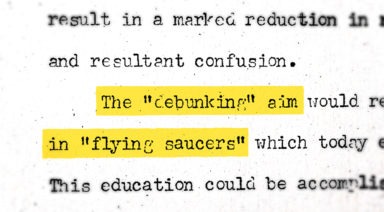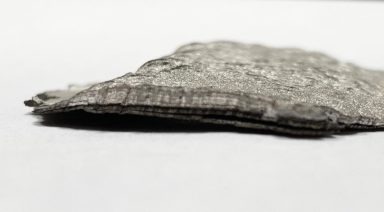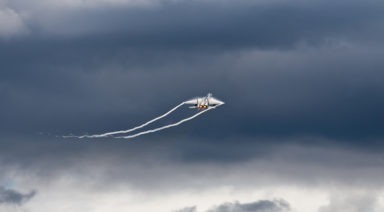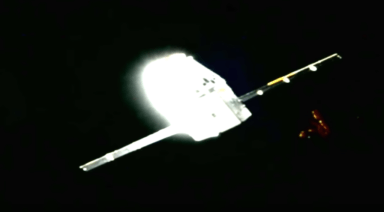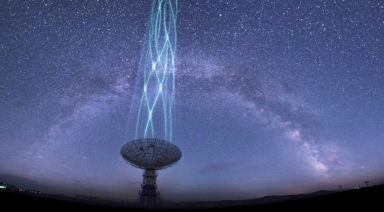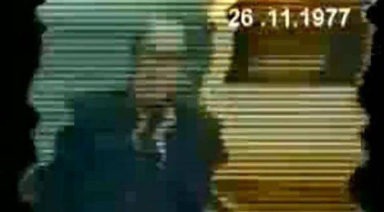Former Senator Harry Reid Discusses Secret Pentagon UFO Program

In an interview with New York Magazine, former Sen. Harry Reid spoke in depth about his interest and participation in acquiring funding for the Pentagon’s black budget study of UFOs. During the interview, Reid said he knows more than he is authorized to say publicly and that the press is being lazy uncovering the truth behind the program.
Reid says he became interested in UFOs while spending time with the late John Glenn. Reid asked the astronaut and former senator if he was interested in Roswell and other instances of UFO phenomenon, to which he replied, “I’ve always had an interest in it.”
Reid says his relationship with Sen. Daniel Inouye and Sen. Ted Stevens furthered his interest in UFOs after hearing about their personal encounters with them while serving in the Air Force.
Shortly thereafter, Reid became friends with Robert Bigelow, the billionaire founder of the eponymous aerospace company that received the contract to store and study metal alloys allegedly recovered from UFOs. Bigelow was awarded the contract after he spent large sums of his own money to build facilities and study existing evidence.
For two years the program was appropriated $11 million annually, during which time significant evidence was documented. Reid said, Luis Elizondo and others involved desperately asked the government to do something about it, to which they were met with inaction. One employee even put his job in jeopardy because he “tried to do something he felt was appropriate.”
According to Reid that employee said, “I don’t know why we’re not doing anything. I’ll bet the Chinese are. I’ll bet the Russians are. I’ll bet the Japanese are. Why aren’t we doing anything?”
Reid went on to say that it’s common for Air Force pilots to see these things, though they’re often afraid to report them because they’ll be ridiculed by their colleagues.
As recently as October 2017, several F-15s were scrambled to intercept an unidentified aircraft flying alongside an airliner over Oregon. The call was made after the aircraft was found to have no transponder and wouldn’t respond to communications from ground control or the airliner. By the time the F-15s were airborne, they lost track of the craft, despite the fighter jets ability to cover the distance of the state in just a few minutes.
Reid concluded the interview saying there is more information out there that the press has yet to discover, saying it seems they prefer to be “spoon-fed” the information.
“We have hundreds and hundreds of papers, pages of papers, that have been available since this was completed,” Reid said. “Most all of it, 80 percent at least, is public.”
Reid didn’t give any clues as to where the information could be found, but urged the interviewer to read the reports, before citing another recent UFO incident in Montana near a missile base.
When asked if there was any information about the program Reid couldn’t discuss publicly, he said, “Yeah, but there’s plenty that can be discussed publicly and I’ve tried to do that,” He said,” You know at this stage in the reports, we have thousands of people who have seen this stuff. Not hundreds – thousands.”
UFOS: The Evidence No One Is Talking About
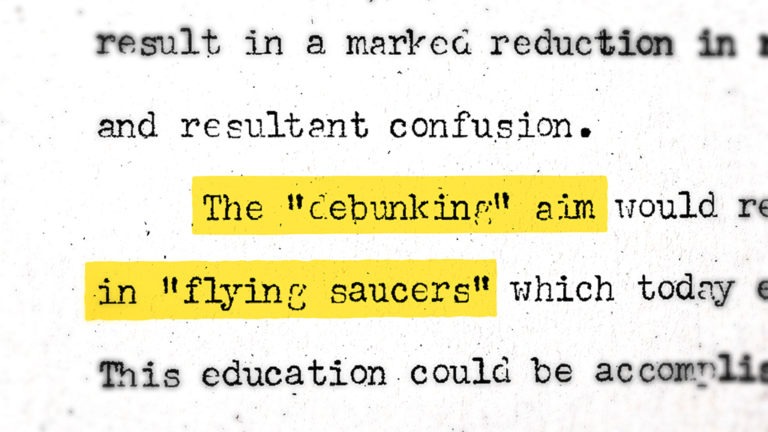
UFOs… whether you’re a believer or a skeptic, there is actually a mounting body of evidence regarding the UFO phenomenon that can no longer be ignored. If you look past all of the alien horror films, the fake blurry UFO videos, and the Ancient Aliens memes, you’d be surprised at how many former high ranking government officials, scientists, and military contractors believe that UFOs should be taken more seriously.
Former Canadian Minister of National Defense, Paul Hellyer, believes we’re already being visited: “At least four alien species have been visiting Earth for thousands of years.” In 2016, Hillary Clinton stated on Jimmy Kimmel that she would search for more UFO files if elected. Hillary’s former campaign manager and former Chief of Staff to President Bill Clinton and Obama, John Podesta, has repeatedly said he believes the UFO phenomenon is something very serious and worth investigating. Before Podesta left his position at the White House, he tweeted, “Finally, my biggest failure of 2014: Once again not securing the #disclosure of the UFO files. #thetruthisoutthere”
10-year-NASA contractor, Rob Bigelow, who develops space habitat pods, gave this shocking statement during a 60 Minutes interview: “There has been and is an existing presence, an E.T. presence. And I spent millions and millions and millions – I probably spent more as an individual than anybody else in the United States has ever spent on this subject.” Those millions of dollars Bigelow spent was authorized by the Pentagon’s top secret UFO research program called the Aerial Threat Identification Program. Rob Bigelow was the sole contractor.
Bigelow continued to explain that you don’t have to go anywhere to find ET life because it’s right underneath our noses. He also said he’s had his own close encounter with an ET. He declined to go into further details. In The New York Times article “Glowing Auras and ‘Black Money’: The Pentagon’s Mysterious U.F.O. Program” they mentioned Bigelow even has recovered UFO debris and metal alloys stored in one of his facilities in Las Vegas. They stated, “researchers also studied people who said they had experienced physical effects from encounters with the objects and examined them for any physiological changes.”
When former Nevada senator and co-founder of the UFO research program, Harry Reid, was interviewed about the debris on CBS 8 Las Vegas, he said he knew nothing about it. However, he was glad that they declassified the program because “now we have scientific evidence.” What scientific evidence is Reid referring to? Whatever the case may be, the Pentagon spent nearly $110 million dollars on the program, proving our government takes UFOs seriously.
The last time the government publically had this level of interest in UFOs was in the 1950’s when UFO sightings were all the craze and were being investigated by the U.S. Air Force under Project Blue Book. After 17 years of research, Blue Book ended in 1968 when the Air Force concluded that most of UFO sightings could be debunked as Venus, satellites, birds, and swamp gas. But here’s what most people don’t know. In 1993, declassified documents from 1952 revealed that the CIA’s Psychological Strategy Board made it a mandate to purposefully debunk all UFO reports for national security concerns. They concluded that when it came to the subject of UFOs, the American people were dangerously gullible and prone to, “hysterical mass behavior.” They feared the Soviets would use UFOs as a distraction to overload intelligence channels and then carry out a genuine attack on American soil.
These documents also revealed that the CIA planned on partnering with the mass media, Hollywood, business clubs, and even the Disney Corporation to discredit all UFO research. How effective they were at implementing that plan is unknown. However, the CIA was successful at debunking UFOs using Project Blue Book.
After reviewing 6 years of data in only 12 hours (just 1% of all the research), the CIA made a hasty conclusion that most of the UFO reports could be explained and that further investigation was not worth the effort. The CIA then ordered the Air Force to stop talking about UFOs and begin a debunking campaign to lessen public interest.
U.S. Congressional hearings in the 1960’s later revealed that Project Blue Book was completely incompetent. Personnel were using improper scientific methods, they were completely understaffed, and were horribly trained. Scientific advisor to Project Blue Book, J. Allen Hynek, an initial skeptic of UFOs, later admitted the Air Force were improperly labeling UFO sightings as explained, despite the absence of any substantial evidence. After Blue Book, Hynek became a ufologist and said that the UFO phenomenon deserved serious scientific examination.
Regardless of the backlash, the CIA and Air Force’s debunking campaigns still worked. UFO research became taboo, people became disillusioned, and the media covered UFOs less and less. The influence of these disinformation campaigns have even discouraged government officials from speaking out. The former governor of Phoenix, Arizona, Fife Symington, during the 1997 Phoenix Lights event is a perfect example.
The Phoenix Lights were witnessed by 20,000 people or more. Shortly after the sighting, the governor made a huge joke about the event during a national press conference. He had a handcuffed man in an alien costume enter the room and said people are taking all of this too seriously. The explanation given at the time was that the lights were flare exercises conducted by the Air Force. However, in 2011, the governor later came forward in the documentary “Secret Access: UFOs on the Record” and confessed that he saw the lights right above him near his house. On CNN he said, “it was probably some form of an alien spacecraft.” Symington explained at the time he was driven to give an explanation instead of just saying “I don’t know” and admitting to complete vulnerability. He continued to say public officials need to be more open and more courageous in dealing with issues like this and that it’s time to square up and do the right thing. The Air Force’s flare explanation was later debunked because they conducted their exercise at 10pm. Thousands of people were reporting the lights as early as 8:30pm.
The UFO ridicule factor, created by the CIA, has succeeded in deterring citizens and public officials from the public discussion of UFOs. However, in the last two decades, more than 500 former government officials, scientists, and contractors have come forward about their concerns over the phenomenon. Hundreds of declassified and leaked UFO documents can be found online, thanks to FOIA requests and tireless researchers. Hopefully more people will learn the truth on the government suppression of UFO research and begin to study the UFO phenomenon with proper scientific methods and an open mind.



